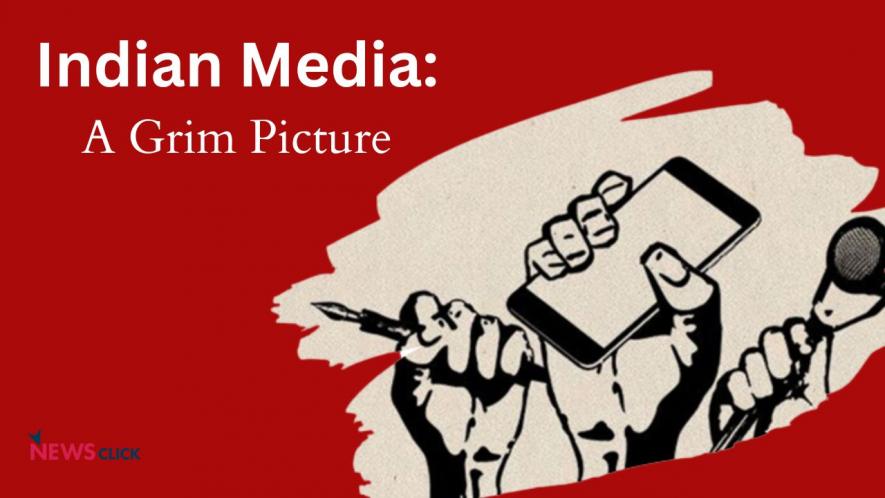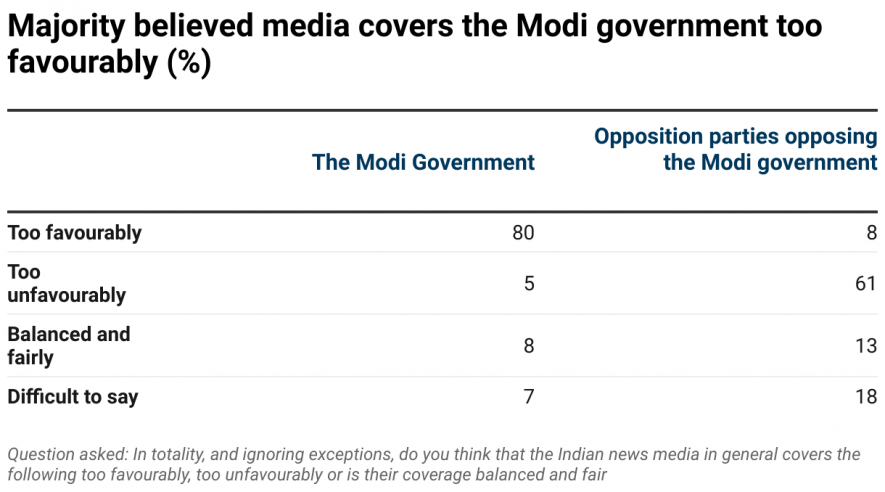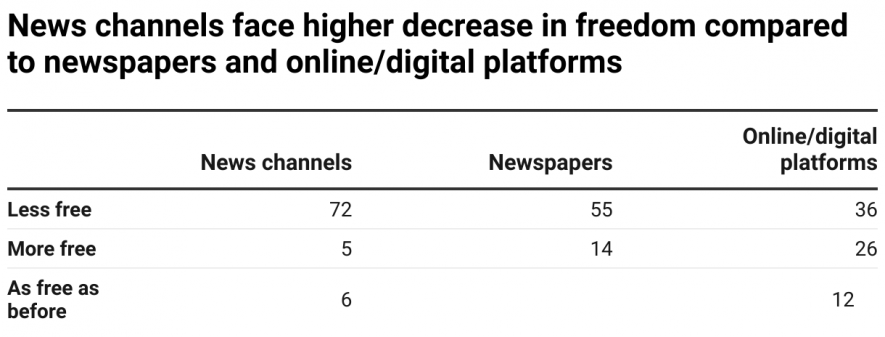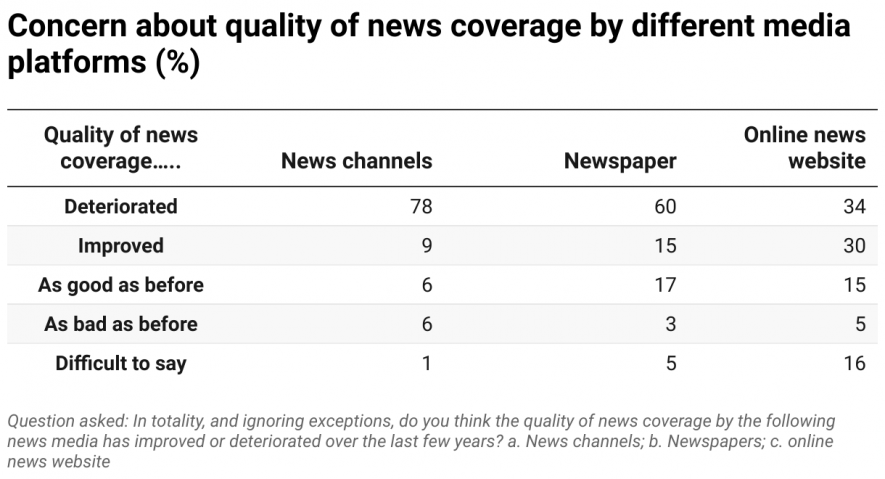75% of Journalists Believe News Channels Are ‘Less Free’ to Do Their Job: Lokniti-CSDS Survey

New Delhi: A report by Lokniti-CSDS, aimed at unveiling insights into the challenges encountered by journalists across the country, revealed on Thursday that three in four journalists believed that news channels were “less free” to do their jobs in the current climate. The number of journalists who felt similarly about newspapers stood at 55%.
The report, titled ‘Media in India: Trends and Patterns’, is based on an online survey conducted among 206 diverse journalists, encompassing various media platforms, language backgrounds, and gender representations, said the think tank in a press release.
Another concerning statistic from the survey said that 82% of the surveyed scribes believed that the media favoured the ruling Bharatiya Janata Party (BJP). A majority of those surveyed (80%) also reported that they found the news coverage to be “too favourable” to the BJP, while 61% felt that it was “too unfavourable” towards the opposition parties.
The report claims to have looked at a number of critical aspects of the media landscape in India. It has attempted to examine the effects of media jobs on journalists' well-being, the impact of social media on news dissemination, and the media's alignment with political parties – revealing a grim picture.
The study found that a significant proportion of surveyed journalists reported experiencing adverse effects on their mental and physical health due to the demanding nature of their profession, while three in five journalists reported that people in their organisations were asked to leave their jobs to reduce costs and maintain economic stability during the pandemic.
The report has also shed light on the role of gender in the difficulties experienced by journalists, the decline of media freedom, and the impact on social media.
Read the detailed findings of the report below:
Press Note
Report Title: Media in India: Trends and Patterns
Release Date: 27th July 2023
Lokniti-CSDS released a report titled "Media in India: Trends and Patterns," on 27th July 2023. The report sheds light on the challenges faced by Indian journalists across the country. The report is based on an online survey conducted among 206 diverse journalists, representing various media platforms (digital, print, and online), language backgrounds (English, Hindi, and regional languages) and gender. The study aimed to provide a comprehensive understanding of the media landscape in India. The survey covered aspects such as the impact of media jobs on mental and physical health, the influence of social media on news dissemination, the media's alignment with political parties, and the future of journalism.
Key Findings:
Impact of Media Job on Mental Health
The study indicates towards the adverse impact of media jobs on journalists' mental and physical well-being. It reveals that a significant proportion of journalists have experienced adverse effects on their mental and physical health due to the demanding nature of their profession; 7 out of 10 journalists experienced mental stress due to the work pressure (Table 1). Table 2 indicate potential gender disparities, with female journalists being more affected by mental stress compared to their male counterparts.
Concerns about Jobs Security
The global pandemic caused economic slowdowns and increased job layoffs in the media industry too like other sectors. Three in five journalists reported that people in their organizations were asked to leave their jobs to reduce costs and maintain economic stability (Table 4). Journalists working in English media were significantly affected as close to three in four (77%) journalists working in English media said that people in their organizations were asked to quit the jobs (Table 5).
The journalists were concerned about their job security. Close to half of the journalists were anxious about losing their jobs, nearly one in five were found to be highly anxious. The anxiety about losing jobs was more prevalent among mid-career journalists as compared to the senior journalists (Table 6). It was also found that women journalists as compared to their male counterparts seem to be more apprehensive about potential job loss due to cost-cutting (Table 7).
When journalists were asked regarding job layoffs in their organisation due to one’s political leanings, the findings suggest that half (52%) of journalists reported no instances of such action within their organizations. However, 16% of journalists had experienced job layoffs or witnessed colleagues being asked to quit their jobs due to their political leanings, ideology, or opinions (Table 8). Further when they were asked about their own anxiety about losing their own jobs due to their political leaning, nearly one in three (31%) shared their concerns, 15% being moderately anxious and 16% were highly anxious for losing their jobs in future due to their political leaning (Table 9).
Political Neutrality & Freedom of Media
Concerns about favouritism and political alignment within the media industry were evident as three-fourths of journalists agreed that there is favouritism towards one particular political party (Table 10) and those believed that media houses favour one particular party, four in five amongst them said that news media favoured the BJP (Table 11).
The data underscores the need for greater media neutrality, as a majority (80%) view the coverage as biased in favor of the incumbent government whereas merely eight percent of journalists believed that media covered the opposition parties favourably and 13% perceived the coverage balanced (Table 12).

The findings suggest that the journalists perceived a decline in media freedom in India, mainly in news channels. Close to three in four surveyed journalists believed that news channels were "Less free" to do their job properly these days whereas a little over half (55%) felt newspapers are "Less free”. This perception was not that strong for the online news websites as 36% had same opinion online news websites (Table 13).

Impact of Social Media on Journalism
While social media has revolutionized information dissemination, it has also brought challenges related to fake news, content influence, and freedom of expression. Keeping this concern in mind shared a divided opinion on the impact of social media on journalism. While majority (two-fifths), believed that social media is equally good and bad for journalist, 35% straightforwardly considered it bad for journalism (Table 14). Journalists also acknowledged the influence of social media trends on news coverage; close to half of journalists (clubbing a lot and somewhat categories) believed that in the last few years, social media trends shaped the news content in their news originations. TV journalists as compared to print and digital media journalists were more likely to report that their organisations were greatly influenced by the social media trends while preparing their news contents (Table 15).
Journalist also shared their concerns about receiving inaccurate information from the internet and social media, nearly three-fourths of journalists expressed a very high level of concern about being misled by inaccurate information on social media and 15% were somewhat concerned (Table 16).
Journalists also shared their hesitancy to freely express their views on social media or messaging platforms due to the fear of job loss. While two-fifths of journalists never felt hesitant to share their personal opinions on social media due to their job loss, nearly one-third journalists felt hesitant to share their personal opinions many times (Table 16).
Trolling and Online Abuse
Nearly two-thirds of journalists reported experiencing online harassment or trolling for their social media posts (Table 17). The data showed that women journalists faced comparatively more trolling than their male counterparts; 70% of women journalists reported experiencing trolling or online abuse, whereas 63% of male journalists reported the same. The findings also suggest that nearly half (52%) of the women journalists surveyed felt that social media platforms were "extremely unsafe" for their privacy, indicating significant concerns about their posts and activities being monitored by someone they don't know or don't want to share information with. This is substantially higher compared to male journalists, where 37% of the male journalists felt the same level of insecurity (Table 18).
Future of journalism
There is a perception of declining reputation and respect for journalism as a profession. A significant portion of journalists expressed dissatisfaction with the standards of journalism followed in news organizations, suggesting concerns about the quality of news coverage by different media platforms - news channels, newspapers and online news websites. A significant portion of journalists believed that the quality of news coverage has deteriorated over the past few years across all media platforms, highly concerned about news channels as nearly four in five journalists believed that news channels' quality has worsened. However, three in five journalists also exhibited the concerns of deterioration on the quality of news coverage by the newspapers. In the meantime, the journalists embedded some trust in the online news media websites as 30% believed that
news coverage by the online news websites has improved (Table 19). The perception of deterioration in media coverage across platforms was higher among the English language journalists than journalists in Hindi and other languages (Table 20).

Get the latest reports & analysis with people's perspective on Protests, movements & deep analytical videos, discussions of the current affairs in your Telegram app. Subscribe to NewsClick's Telegram channel & get Real-Time updates on stories, as they get published on our website.
























